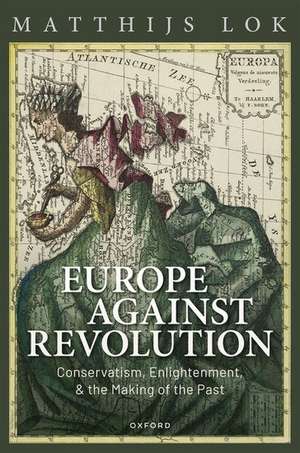Europe against Revolution: Conservatism, Enlightenment, and the Making of the Past
Autor Matthijs Loken Limba Engleză Hardback – 23 mar 2023
Preț: 704.79 lei
Preț vechi: 860.96 lei
-18% Nou
Puncte Express: 1057
Preț estimativ în valută:
134.86€ • 141.20$ • 111.86£
134.86€ • 141.20$ • 111.86£
Carte disponibilă
Livrare economică 08-14 martie
Preluare comenzi: 021 569.72.76
Specificații
ISBN-13: 9780198872139
ISBN-10: 0198872135
Pagini: 384
Dimensiuni: 165 x 240 x 25 mm
Greutate: 0.75 kg
Editura: OUP OXFORD
Colecția OUP Oxford
Locul publicării:Oxford, United Kingdom
ISBN-10: 0198872135
Pagini: 384
Dimensiuni: 165 x 240 x 25 mm
Greutate: 0.75 kg
Editura: OUP OXFORD
Colecția OUP Oxford
Locul publicării:Oxford, United Kingdom
Recenzii
In Europe Against Revolution, Matthijs Lok makes a nuanced and persuasive case for the role and significance of historical interpretations of a common Europe for a varied cast of counter-revolutionaries in the period between 1789 and the years that immediately followed the Congress of Vienna. History provided both a form and a framework for the expression of variously styled conservative or counter-revolutionary thought, whether German, French, Dutch, or British-indeed, the wealth of sources in multiple languages is one of the strengths of the book.
Lok's book .... constitutes an important work, destined to mark a landmark in European history studies, which until today have mostly insisted on the tradition linked to the importance of 1789.
Matthijs Lok's new book makes a scholarly and damning case against the presentism of the chattering classes. While the book resists explicit prescriptive claims, its construction and conception indicate an interest in the deconstruction of contemporary political semantics, as well as a truer articulation of the radical, liberal, and conservative strains of thought.
Lok convincingly shows that the often difficult to interpret sources are worth studying and that counter-revolutionary publicists were by no means the uninteresting reactionaries they were so often have been taken for (...). Anyone who completes the reading of Lok's highly original work will be deeply impressed by the intellectual depth of the analysis offered.
The main aim of the book is to excavate a forgotten genealogy of the history of Europe as a cultural and political region, derived not from the liberatory promises of the French Revolution but from counter-Enlightenment scholars who opposed the Revolution and its legacies (...) The book challenges conventional historical narratives of the development of both nationalism and cosmopolitanism in Europe. (...) I know of no other monographic study that treats both the French and German counter-revolutionary historians within the same frame. For all these reasons, the book is original and significant, both analytically and synthetically
This knowledgeable and carefully developed presentation of "historical Europeanism" (...) makes a contribution to the history of European historiography that is well worth reading. The nineteenth century, usually researched as an age of national historiographies, appears in a unusual light.
M. Lok's book offers a rich and stimulating analysis. It provides food for thought for those interested in counter-revolutionary thought and the European idea, of course, but also more broadly in the cosmopolitan and transnational dynamics of European intellectual life at the turn of the eighteenth and nineteenth centuries.
Lok's book .... constitutes an important work, destined to mark a landmark in European history studies, which until today have mostly insisted on the tradition linked to the importance of 1789.
Matthijs Lok's new book makes a scholarly and damning case against the presentism of the chattering classes. While the book resists explicit prescriptive claims, its construction and conception indicate an interest in the deconstruction of contemporary political semantics, as well as a truer articulation of the radical, liberal, and conservative strains of thought.
Lok convincingly shows that the often difficult to interpret sources are worth studying and that counter-revolutionary publicists were by no means the uninteresting reactionaries they were so often have been taken for (...). Anyone who completes the reading of Lok's highly original work will be deeply impressed by the intellectual depth of the analysis offered.
The main aim of the book is to excavate a forgotten genealogy of the history of Europe as a cultural and political region, derived not from the liberatory promises of the French Revolution but from counter-Enlightenment scholars who opposed the Revolution and its legacies (...) The book challenges conventional historical narratives of the development of both nationalism and cosmopolitanism in Europe. (...) I know of no other monographic study that treats both the French and German counter-revolutionary historians within the same frame. For all these reasons, the book is original and significant, both analytically and synthetically
This knowledgeable and carefully developed presentation of "historical Europeanism" (...) makes a contribution to the history of European historiography that is well worth reading. The nineteenth century, usually researched as an age of national historiographies, appears in a unusual light.
M. Lok's book offers a rich and stimulating analysis. It provides food for thought for those interested in counter-revolutionary thought and the European idea, of course, but also more broadly in the cosmopolitan and transnational dynamics of European intellectual life at the turn of the eighteenth and nineteenth centuries.
Notă biografică
Matthijs Lok studied European history at the Universities of Liverpool, Leiden, and Yale, followed by a brief career as a policy advisor. In 2009 he took his PhD at the History Department of the University of Amsterdam. In 2011 Lok received tenure as an universitair docent and in 2015 he became senior university lecturer. Lok was appointed a senior fellow of the Netherlands Institute for Advanced Study NIAS (2019-20) and held visiting positions at the Lichtenberg Kolleg & Moritz Stern Institut Göttingen, Germany (2021-22) and the KU Leuven, Belgium (2022).
